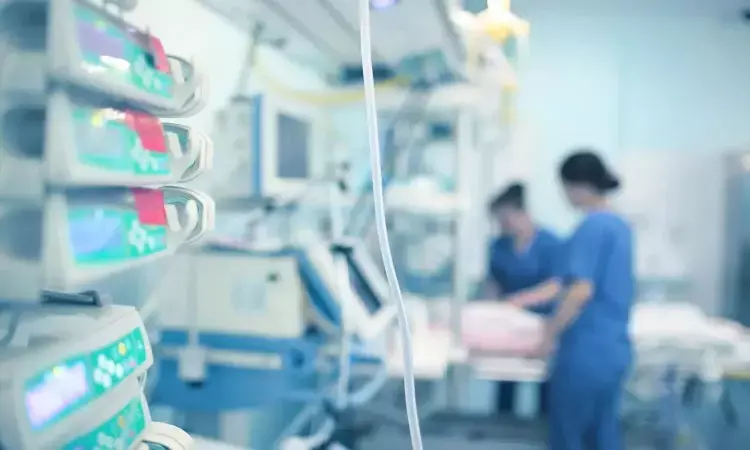- Home
- Medical news & Guidelines
- Anesthesiology
- Cardiology and CTVS
- Critical Care
- Dentistry
- Dermatology
- Diabetes and Endocrinology
- ENT
- Gastroenterology
- Medicine
- Nephrology
- Neurology
- Obstretics-Gynaecology
- Oncology
- Ophthalmology
- Orthopaedics
- Pediatrics-Neonatology
- Psychiatry
- Pulmonology
- Radiology
- Surgery
- Urology
- Laboratory Medicine
- Diet
- Nursing
- Paramedical
- Physiotherapy
- Health news
- Fact Check
- Bone Health Fact Check
- Brain Health Fact Check
- Cancer Related Fact Check
- Child Care Fact Check
- Dental and oral health fact check
- Diabetes and metabolic health fact check
- Diet and Nutrition Fact Check
- Eye and ENT Care Fact Check
- Fitness fact check
- Gut health fact check
- Heart health fact check
- Kidney health fact check
- Medical education fact check
- Men's health fact check
- Respiratory fact check
- Skin and hair care fact check
- Vaccine and Immunization fact check
- Women's health fact check
- AYUSH
- State News
- Andaman and Nicobar Islands
- Andhra Pradesh
- Arunachal Pradesh
- Assam
- Bihar
- Chandigarh
- Chattisgarh
- Dadra and Nagar Haveli
- Daman and Diu
- Delhi
- Goa
- Gujarat
- Haryana
- Himachal Pradesh
- Jammu & Kashmir
- Jharkhand
- Karnataka
- Kerala
- Ladakh
- Lakshadweep
- Madhya Pradesh
- Maharashtra
- Manipur
- Meghalaya
- Mizoram
- Nagaland
- Odisha
- Puducherry
- Punjab
- Rajasthan
- Sikkim
- Tamil Nadu
- Telangana
- Tripura
- Uttar Pradesh
- Uttrakhand
- West Bengal
- Medical Education
- Industry
Targeted muscle reinnervation may reduce pain and complications after amputation

USA: Findings from a recent study published in Plastic and Reconstructive Surgery highlight the promising role of targeted muscle reinnervation (TMR) in the prevention of neuropathic pain and neuroma formation at the time of amputation.
Performed early – at the time of amputation-a procedure called targeted muscle reinnervation can reduce pain scores and prevent complications related to abnormal nerve regrowth, the study stated.
"Our experience suggests that that acute TMR reduces neuroma formation, and lowers the incidence of both phantom limb pain and residual limb pain," comments senior author Amy M. Moore, MD, of Ohio State University Wexner Medical Center, Columbus.
Acute versus delayed TMR: Five-year experience supports early nerve intervention
Patients undergoing amputation are at risk of certain types of chronic pain problems. They may experience phantom limb pain, a sensation of pain in the missing limb; or residual limb pain, felt in the remaining portion (stump) of the amputated limb. For patients who suffer from one or both types of post-amputation pain, the effects on their quality of life are significant.
Targeted muscle reinnervation is a surgical procedure in which the cut nerve is transferred, i.e., "re-wired" to a working nerve in an adjacent muscle. First developed to enhance control of prostheses after amputation, TMR may also help to decrease phantom and residual limb pain after amputation. However, there are continued questions about the effects of the timing of TMR: acute or early, performed at the time of amputation; or delayed, performed after the development of a symptomatic neuroma.
Dr. Moore and colleagues reviewed their experience with TMR in 103 patients (105 limbs) undergoing amputation. In 73 limbs, acute TMR was performed at the time of amputation. In 32 limbs, TMR was delayed, performed after development of a symptomatic neuroma – i.e., scarring and disorganized regrowth of cut nerves.
Lower pain scores, lower neuroma risk after acute TMR
Comparison suggested improved outcomes in the immediate TMR group. Just one percent of patients undergoing acute TMR had recurrent, symptomatic neuromas in the area served by the reconnected nerve, compared to 19 percent in the delayed TMR group. The difference remained significant after adjustment for other characteristics (age, sex, and limb involved). Neuroma risk in other nerve distributions was unaffected by the timing of TMR.
Patient-reported pain scores were available for 62 limbs in the acute TMR group and 20 in the delayed TMR group. Patients undergoing acute TMR had lower pain intensity and severity scores, as well as lower scores for pain interference with daily activities.
The findings add to previous promising results for TMR in improving post-amputation outcomes. The researchers note that the observed 1.4% neuroma rate in the acute TMR group is lower than reported in previous studies, supporting "the effectiveness of early intervention with TMR." They add: "[E]arly restoration of the physiologic function of nerves treated by TMR in the acute amputation setting may prevent those nerves from aberrantly regenerating in the absence of TMR."
While early TMR may have advantages, the experience also demonstrates beneficial effects of delayed TMR for patients with phantom or residual limb pain after amputation. In both groups, "the percentage of patients reporting no pain is nearly two times higher than the general amputee population," the researchers add.
While acknowledging the limitations of their single-center, non-randomized study, Dr. Moore and coauthors conclude: "The results further highlight the promising role of TMR in the prevention of neuropathic pain and neuroma formation when performed at the time of amputation and reinforce what we know about TMR as an effective procedure to treat symptomatic post-amputation pain."
Reference:
Goodyear EG, O'Brien AL, West JM, Huayllani MT, Huffman AC, Souza JM, Schulz SA, Moore AM. Targeted Muscle Reinnervation at the Time of Amputation Decreases Recurrent Symptomatic Neuroma Formation. Plast Reconstr Surg. 2024 Jan 1;153(1):154-163. doi: 10.1097/PRS.0000000000010692.
Dr Kamal Kant Kohli-MBBS, DTCD- a chest specialist with more than 30 years of practice and a flair for writing clinical articles, Dr Kamal Kant Kohli joined Medical Dialogues as a Chief Editor of Medical News. Besides writing articles, as an editor, he proofreads and verifies all the medical content published on Medical Dialogues including those coming from journals, studies,medical conferences,guidelines etc. Email: drkohli@medicaldialogues.in. Contact no. 011-43720751


